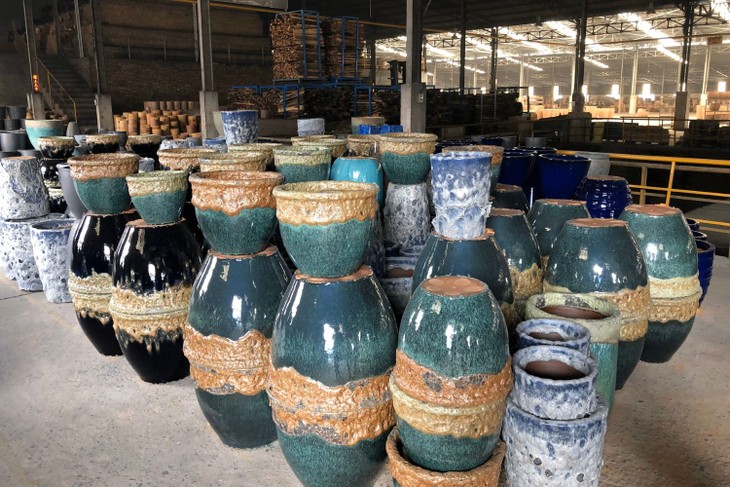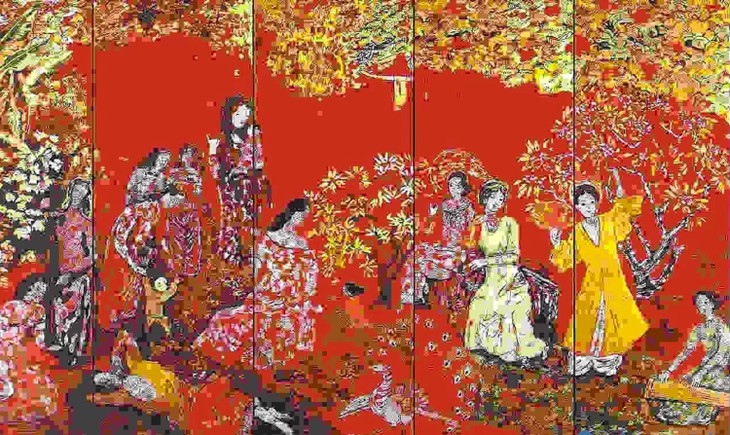(VOVWORLD) - Beside its long standing culture and history, the southern province of Binh Duong is famous for its traditional crafts such as ceramics, lacquerware, wood carving, and rattan weaving. Well-known brands include Lai Thieu pottery, Tan Phuoc Khanh pottery, Xua pottery, piggy bank making in Thuan A, the Dai Hung kiln, Tuong Binh Hiep lacquerware, Chanh Nghia wood carving, and the Ba Nhat bamboo and rattant weaving cooperative. In recent years, Binh Duong has focused on applying emerging technology and digital transformation, while preserving and promoting traditional crafts for tourism and economic development.
 Binh Duong pottery products are well-known for their sophistication. (Photo: congluan.vn) Binh Duong pottery products are well-known for their sophistication. (Photo: congluan.vn) |
To preserve and develop traditional crafts, craft villages in Binh Duong have invested in semi-automated or fully automated production in line with Industry 4.0 technology, while at the same time shifted to linking craft village activities with tourism development.
Change for adaptation
A number of local ceramic companies, including Minh Long 1, Cuong Phat, and Phuoc Vu Long, are examples of using technological innovation in craft villages.
Mr. Ly Ngoc Bach, General Director of Cuong Phat Ceramics Co., Ltd., who is also Chairman of the Binh Duong Ceramics Association, said that ceramic operations in Binh Duong province have focused on the domestic market by adapting new designs and color enamels.
“Binh Duong ceramic products are aiming for the domestic market. I hope this year, our domestic sales will increase strongly,” said Bach.
Thanks to diversifying methods to introduce products both directly and online through social media and e-commerce sites, the products of Thanh Loc Bamboo and Rattan Co., Ltd. in Tan Phuoc Khanh ward have enjoyed high consumption. Mr. Nguyen Thanh Lap, Deputy Director of Thanh Loc Bamboo and Rattan Co., Ltd., said that the company consults directly with its clients on the price, design, and quality of products online.
“Our online sales are generally stable. Currently, we are exporting to Australia, Japan, and European countries. Our products are especially favored by European customers because they are environment-friendly. The products’ durability last years,” said Lap.
Like rattan weaving and pottery, other traditional craft villages in Binh Duong such as lacquerware and wood carving are also finding ways for their products to survive fierce competition and continuous changes from consumer demand. Along with changing production methods, craft villages have also gradually applied digital technology to their production and business management to develop more broadly.
Beside individual efforts, Binh Duong authorities have taken many measures to preserve and develop traditional craft villages.
A separate area will be designated for the crafts that are now produced in residential areas to reduce the risk of creating pollution from activities such as pottery and piggy bank making.
Manufacturing establishments facing difficulties are supported with loans to continue maintaining the craft. Binh Duong has also paid great attention to training a labor force for the local craft villages.
 Many visitors show their interest in Binh Duong’s lacquer paintings. (Photo: congluan.vn) Many visitors show their interest in Binh Duong’s lacquer paintings. (Photo: congluan.vn) |
Tourism development associated with preserving traditional craft villages
One of Binh Duong’s solutions to preserve and sustainably develop traditional craft villages is to link their prosperity with the development of tourism. This is considered a right step, not only to expand the market and open up more opportunities to promote the development of traditional craft village products, but also to contribute to preserving and promoting their cultural values and traditions in each craft village.
Binh Duong has worked on the project “Preserving and Developing Tuong Binh Hiep Lacquer Craft Village Combined with Tourism in Thu Dau Mot City”, under which a 54,000 square meter craft village will be built.
“I hope that I will be able to work in this craft village soon. Thanks to the effort and support of the State and the local authorities, more tourists will come here and buy products. I hope the lacquer craft will further develop,” said 52-year-old artisan Dinh Cong Thieu.
According to the Binh Duong province tourism development project to 2025 with a vision to 2030, the provincial People’s Committee has defined visiting and hands-on experience at traditional craft villages as a main attraction to tourists to develop tourism as an economic spearhead in the province.
Accordingly, the Department of Culture, Sports and Tourism of Binh Duong province has assigned the Center for Promotion and Tourism to launch promotional programs for tourists about craft villages. The Center has organized many tours to connect and introduce craft villages to visitors. The center has also introduced and promoted Binh Duong craft village products to domestic and international tourists at promotional trade fairs both inside and outside Vietnam.
“We have asked the Department of Agriculture and Rural Development to recognize the traditional craft products as OCOP (One Commune One Product) products. We will work together to introduce and promote our products online and at trade fairs. We hope that Binh Duong traditional handicrafts will become more and more popular in other areas,” said Nguyen Thanh Phong, Deputy Director of the Department of Culture, Sports and Tourism of Binh Duong province.
With proactive transformation to adapt and provide appropriate support solutions associated with local economic and tourism activities, 32 craft villages with 9 traditional crafts in Binh Duong will certainly be preserved and developed, contributing to local socio-economic development.